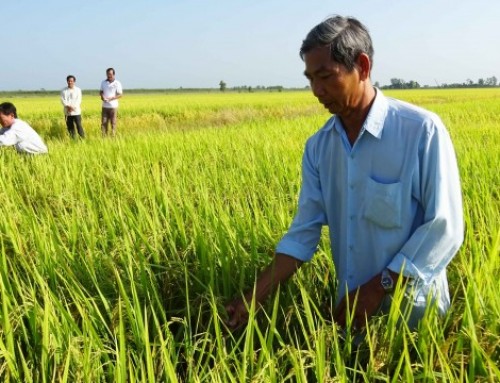A Study Tour to Thailand

The GIZ-ASEAN Sustainable Agrifood Systems (ASEAN-SAS) project in Cambodia has brought people together to strengthen the capacity of farmers in organic production techniques, to help them establish linkages to international markets. To that end, the technical staff of GIZ ASEAN-SAS (Cambodia and Thailand), the Cambodian Center for Study and Development in Agriculture (CEDAC), and CEDAC Sahakreas Ltd. (SKC) undertook a study tour to Thailand, which took place 25-29 January 2015. The aims of the study tour were:
- To share experiences with entities working in the organic food sector in Thailand,
- To study agricultural best practices, including CO2 fumigating procedure for organic rice, and
- To strengthen the network between practitioners in the organic agriculture sector.
Entities were selected according to the technical background and specific interest of the participants. In the beginning, participants presented their experiences with organic rice value chain development in Cambodia, where the demand for organic rice has been gradually growing. However, there is no established national regulation on the certification and declaration of organic agricultural products, meaning that anyone can claim that their products are organic without any certification. CEDAC has been working with small-scale farmers to promote organic rice production, resulting in the export of approximately 1,000 tons of organic and fair-trade certified rice in 2014. To comply with international organic standards, CO2 fumigation to eliminate insects before shipment is a requirement for export. Herba Bangkok Sl is a company experienced in CO2 fumigation and marketing strategies for organic rice. In order to tackle the lack of experience in the CO2 fumigation procedure, Herba showcased the treatment for the participants: 2kg of CO2 per ton of rice must be circulated consistently in a covered plastic bag. The share of oxygen must be lower than 13.7%, and the concentration of oxygen and CO2has to be regularly monitored, or else insects will not be killed within 14 days. In its warehouses, Herba uses mechanical traps, daily cleaning and uniform packaging. Herba buys from organic rice farmer cooperatives and exports mainly to the US and the EU. They are very interested in importing premium organic fragrant and non-fragrant rice, as well as half broken rice, which is an opportunity for Cambodian farmers and CEDAC to enter the market. During the next rice season there will be a joint workshop between farmers, CEDAC and Herba to discuss the production plan.

Xungdur is another organic food company known for initiating market-linked organic food processing, working closely with organic farmer cooperatives that use their own resources to produce
fertilizer and bio-pesticides in compliance with organic standards. Xungdur used to apply conventional practices, which involve high chemical inputs, ultimately causing health problems and low profits. However, once the owner of Xungdur discovered that following organic principles is the most effective method in developing and improving health, she began to promote organic rice and vegetable production to farmers, providing weekly trainings on organic agricultural techniques. She altered Xungdur’s product lines to contain only organic rice, and developed food processing and packaging lines. Xungdur’s products are now well known and in high demand. Government agencies and organizations are assisting the cooperative with production techniques, marketing, and financial resources to strengthen the company’s sustainability.The study tour was very useful and informative to the participants, who gained a better understanding of the concepts and principles of effective business practices and production techniques. Moreover, they benefited from lessons and experiences shared at the training workshop, not only to improve their own knowledge but also to develop ideas that will promote the sustainable development of organic agriculture in Cambodia.





